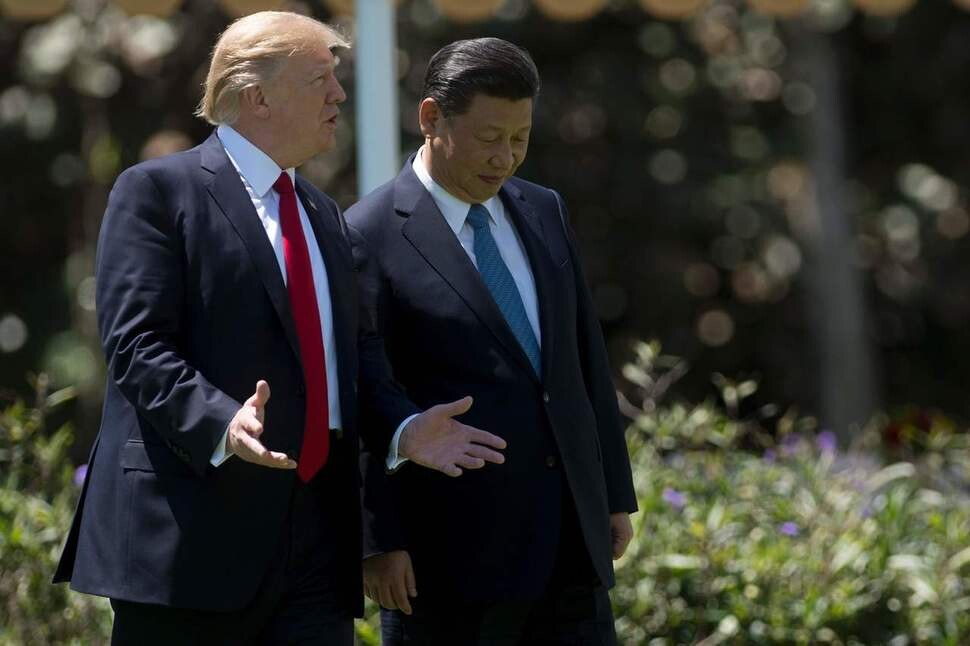hankyoreh
Links to other country sites 다른 나라 사이트 링크
Donald Trump says “Korea actually used to be a part of China”

US President Donald Trump has stirred up controversy by his reported remark that “Korea actually used to be part of China.” He made the remark after saying that Chinese President Xi Jinping had explained Chinese and Korean history to him during their Apr. 6-7 summit.
Trump’s remarks were reported by the Wall Street Journal in an interview conducted in the Oval Office on Apr. 12. They were included among excerpts of specific comments Trump had made.
“[Xi] then went into the history of China and Korea. Not North Korea, [all of] Korea. And you know, you’re talking about thousands of years . . . and many wars. And Korea actually used to be a part of China,” Trump was quoted as saying while discussing the summit with Xi.
“After listening [to Xi] for 10 minutes I realized that . . . it’s not so easy,” he continued.
“You know I felt pretty strongly that . . . they had a tremendous power over. I actually do think they do have an economic power [over North Korea], and they have certainly a border power to an extent, but they also - a lot of goods come in [from North Korea]. But it’s not what you would think,” he added.
While the reference to Korea “actually being part of China” could have been a faithful recounting of Xi’s “history lecture,” it may also have been a mixture of Xi’s explanation with Trump’s own perceptions. The publicly made remarks are now stirring up controversy not only as an indication of Trump’s ignorance of Korean history, but also a breach of diplomatic protocol. If Xi did in fact say something along those lines at the summit, he too opens himself up to charges of being hegemonic and Sinocentric in his view of history.
Trump went on to say that “you cannot allow a country like [North Korea] to have nuclear power, nuclear weapons.”
“That’s mass destruction. And [Kim Jong-un] doesn’t have the delivery systems yet, but you know he will,” he added.
Of Xi Jinping, Trump said, “We have a very good relationship.”
“We have a great chemistry together. We like each other. I like him a lot,” he said.
Quartz called Trump comments about Korea historically being part of China a “glaring historical inaccuracy.”
“No respectable historian would make such a claim,” the site quoted University of Southern California history professor Hwang Kyung-moon as saying.
Quartz speculated that Xi may have spoken of the commanderies set up on the northern Korean Peninsula in the second century BCE or the Mongol conquest of Goryeo in the 13th century, which Trump may have interpreted as a reference to Chinese rule over Korea.
“Even [in the 13th century], the Mongols controlled China more directly than Korea,” Hwang said, adding that it would be more appropriate to say that “Korea was once a part of the same empire as China” - i.e., the Mongolian Yuan Dynasty.
After Trump’s remarks triggered an outcry from South Korean netizens, Minjoo Party election commission PR team leader Youn Kwan-suk said at an Apr. 19 briefing that he hoped the “leaders of US and China will address the veracity of these reports.”
“The 50 million citizens of the Republic of Korea, and conscientious people the world over, cannot contain their bafflement and astonishment,” Youn said.
“Any child knows that Koreans have a unique history distinct from that of China,” he continued.
“I hope we will once again make it clear that we are going to play a leading role in addressing Korean Peninsula issues and the issue of unification.”
By Ahn Chang-hyun, staff reporter
Please direct questions or comments to [english@hani.co.kr]
Editorial・opinion
![[Column] Has Korea, too, crossed the Rubicon on China? [Column] Has Korea, too, crossed the Rubicon on China?](https://flexible.img.hani.co.kr/flexible/normal/500/300/imgdb/original/2024/0419/9317135153409185.jpg) [Column] Has Korea, too, crossed the Rubicon on China?
[Column] Has Korea, too, crossed the Rubicon on China?![[Correspondent’s column] In Japan’s alliance with US, echoes of its past alliances with UK [Correspondent’s column] In Japan’s alliance with US, echoes of its past alliances with UK](https://flexible.img.hani.co.kr/flexible/normal/500/300/imgdb/original/2024/0419/2317135166563519.jpg) [Correspondent’s column] In Japan’s alliance with US, echoes of its past alliances with UK
[Correspondent’s column] In Japan’s alliance with US, echoes of its past alliances with UK- [Editorial] Does Yoon think the Korean public is wrong?
- [Editorial] As it bolsters its alliance with US, Japan must be accountable for past
- [Guest essay] Amending the Constitution is Yoon’s key to leaving office in public’s good graces
- [Editorial] 10 years on, lessons of Sewol tragedy must never be forgotten
- [Column] A death blow to Korea’s prosecutor politics
- [Correspondent’s column] The US and the end of Japanese pacifism
- [Guest essay] How Korea turned its trainee doctors into monsters
- [Guest essay] As someone who helped forge Seoul-Moscow ties, their status today troubles me
Most viewed articles
- 1[Column] The clock is ticking for Korea’s first lady
- 2Hong Se-hwa, voice for tolerance whose memoir of exile touched a chord, dies at 76
- 3After 2 months of delayed, denied medical care, Koreans worry worst may be yet to come
- 4[Column] Has Korea, too, crossed the Rubicon on China?
- 5US overtakes China as Korea’s top export market, prompting trade sanction jitters
- 6[Correspondent’s column] In Japan’s alliance with US, echoes of its past alliances with UK
- 7All eyes on Xiaomi after it pulls off EV that Apple couldn’t
- 8Samsung barricades office as unionized workers strike for better conditions
- 9[Photo] Smile ambassador, you’re on camera
- 10[Correspondent’s column] The US and the end of Japanese pacifism